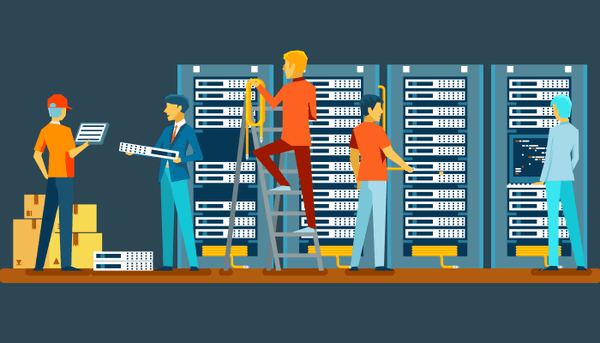
Data Center Strategies to Improve Your Business
July 3, 2020
6 Ways Coronavirus Is Going to Change the IT Industry Forever
July 8, 2020The data center sector sees consistent growth. The future of job availability is bright, but you have to be highly skilled to become a data center operator or technician. The newly required skills are closely related to the implementation of 5G technology, but you need the foundational capacity as well.
According to the stats available on Glassdoor, the average base pay for a data center technician is $58K and can reach up to $86K annually.
The salaries reflect more than experience. They are mostly dependent on the employee’s skills. If you’re a highly skilled and irreplaceable administrator, your salary can easily reach six figures.
Let’s see: what are the essential data center skills that you need to succeed in this sector?
What Skills Will Data Center and Networking Professionals Need in 2024?
The demand in skills for data center and networking fields in 2024, with demand soaring for professionals skilled in AI, automation, infrastructure management, and network security. As organizations aim to enhance their infrastructure with a focus on sustainability, energy efficiency, hybrid clouds, and cybersecurity, the scarcity of trained professionals poses a major challenge. Gartner’s Paul Delory highlights this enduring skills crisis, urging organizations to train internal staff to fill these gaps.
Key skills in demand include expertise in cloud platforms and services, as cloud spending is expected to grow substantially. The rise of industry cloud platforms demands proficiency in cloud security, various programming languages, and an understanding of major cloud providers like AWS, Microsoft, and Google. Artificial intelligence and automation are revolutionizing operations and security within data centers, necessitating skills in predictive analytics and AI-driven security measures. Additionally, the importance of network security skills continues to grow in response to increasing cyber threats, requiring knowledge beyond traditional defenses.
Professionals are also needed who can manage data center and network infrastructures proactively and holistically, incorporating emerging technologies and platform engineering to enhance developer productivity and operational efficiency. This evolving landscape offers a wealth of opportunities for those equipped with these in-demand skills.

Why Are Cloud Skills Crucial for Data Center Professionals Today?”
The growing 5G practicalities strengthen the cloud computing environment. Organizations that use 5G networks benefit from much faster data transfers.
Employers from this sector are most likely to require a set of cloud security and cloud architect skills from applicants. Colocation connectivity expertise is high on the list of requirements, too.
If you’re still learning and building your career, you’ll only benefit from acquiring any type of cloud computing certification.
How Important Are Data Security Skills for Modern Data Centers?
All data centers are focused on becoming more intuitive and agile. But most of all, they focus on increasing the levels of security. As the industry grows, so does the concern for keeping all data safe in the centers.
Billions of devices are online right now. That makes data centers more complicated to secure and manage, so you should keep in mind that this is not an easy skill to obtain. You’ll need to know how to use network intelligence to enable undisturbed performance, analyze data, and automate functions without any security risks.
Why Is Quick Decision-Making Essential for Data Center Management?
If you plan to reach the level of a data center infrastructure manager, this is an essential skill to have. You’ll need to be informed about all new trends in the data center industry, the challenges in management, and the new software solutions that drive the industry forward.
Management in this industry is not only about dealing with a team. You’ll be faced with new solutions and opportunities to implement them in your organization’s environment. You’ll have to keep pace with the industry’s growth all the time.
If you’re convinced that you have what it takes for this position, hiring an expert to write your resume is a good idea. The writer will convey your character and skills through the application. However, you also need an exceptional blog that proves you’re informed about the latest trends, and you can even take the role of an educator.
How Does Data Analysis Impact Data Center Efficiency and Performance?
Power distribution units and other smart devices with environmental sensors deliver a constant stream of data that’s crucial to the functionality of the data center. This data is massive and too complex to be analyzed by laymen. That’s why these centers hire professional data analysts, who can translate that data into information that the managers can use.
Almost every challenge that a data center faces can be addressed by analyzing the data that’s available. Let’s say that energy consumption has been reaching levels higher than usual lately. The data related to power usage effectiveness lets the analyst evaluate humidity, temperature, open perforated tiles, and more. When this data is translated into actionable advice, the management can take action to lower the power use without affecting the center’s effectiveness.

What Role Do LAN/WAN Design Skills Play in Data Center Operations?
LAN/WAN engineers are responsible for setting up and ensuring the functionality of wide-area and local-area networks. The data center doesn’t hire them just to set up the network. They are needed to monitor its performance as well. Part of their responsibility is to identify potential issues and make changes that would prevent damage from occurring.
If you gain these skills, you can work as a full-time engineer in a data center. However, you can also offer your services as a freelancer.
Why Is Cabling Expertise Still Valuable in Today’s Wireless Data Centers?
Although we’re moving towards more wireless technologies in data centers, the truth is cables are still crucial. They ensure stable, fast connections that are key for handling large amounts of data, something wireless networks aren’t always able to do. This is why there’s still a high demand for people skilled in cabling. It’s not just about laying down cables; it involves planning networks, solving problems, and keeping the system running at its best. As data centers keep integrating wired and wireless technologies, knowing how to manage cables remains important for maintaining a reliable and efficient operation.
How Essential Is Understanding Data Center Fundamentals for Newcomers?
For anyone looking to enter the data center field, grasping the basics is the first crucial step. While a specific degree might not be mandatory, having a solid foundation in data center operations significantly boosts your chances of success. If your academic institution doesn’t provide specialized training, numerous online resources, like courses from Schneider Electric, offer a pathway to acquire essential knowledge. These fundamentals not only help you get your foot in the door but also lay the groundwork for advancing in your career. Being proactive about your education in data center principles can set you apart in the competitive job market.
What Certifications Boost Your Career in Data Center Technologies?
The demand in this sector is high, and the competition is fierce. University education is not an absolute necessity, although it’s highly recommended. Certificates, on the other hand, show that you’re skilled in the position you target.
These are the certificates to look into:
- Cisco UCS (Unified Computing System) Certificate
- DCIM (Data Center Infrastructure Management) Certificate
- CCNA (Cisco Certified Network Associate)
- CCNP (Cisco Certified Network Professional)
First, you should figure out what job you want to pursue. Then, do your research to see what type of certificate would help you get it. If you go through job ads, you’ll easily identify the needed certifications and skills.
Why Are Stamina and Dedication Key to Succeeding in Data Center Careers?
All skills we listed above are professional, and they are needed for different positions in the data center. But we should stress the importance of personal skills, too. First and foremost, you need stamina. Data centers have to be up and going 24/7. In many situations, critical employees are required to take extra hours. So you need to be dedicated and energized enough to withstand long bouts without burning out.
For most data center workers, that’s not a big problem. They love their job!

What Are the Key Strategies for Developing the Future Data Center Workforce?
Why Are STEM Programs Crucial for the Future of Data Center Professionals?
There are several different aspects that will be important for the future of the data center workforce. This includes highlighting STEM programs, empowering the current data center workforce, and finding talent from new places. All of these facets can make the data center industry workforce stronger in the future.
One of the most important aspects of growing the future of the data center industry and the industry of technology is highlighting STEM programs. STEM programs are imperative for the future of the data center industry because they help to produce a workforce that is well-equipped to design, build, and maintain data centers. Data centers are critical infrastructures that play a key role in supporting the growth and development of the digital economy. They are responsible for storing, processing, and managing vast amounts of data, and they require highly trained professionals who can ensure that they operate efficiently and reliably.

Data centers rely on a wide range of technologies, including computer hardware, software, networking, and data storage. These technologies are constantly evolving, and data center professionals must be able to stay up to date with the latest developments to be effective in their roles. STEM programs help to provide students with the knowledge and skills they need to succeed in these roles, including a strong foundation in math and science, as well as expertise in computer programming and engineering.
STEM programs not only give students knowledge but also help to foster a culture of innovation and problem-solving, which are crucial skills in the data center industry. By encouraging students to pursue careers in STEM fields, we can help to ensure that the data center industry has the talent it needs to continue to thrive and meet the growing demand for data storage and processing.

How Can Empowering the Current Data Center Workforce Shape the Industry’s Future?
Another aspect that will be important for the future of the data center industry is empowering the current workforce. A workforce that is empowered is more likely to be engaged and motivated in their work, which can lead to improved efficiency and productivity. Empowering data center professionals to take ownership of their work and make decisions enables them to use their skills and expertise to solve problems and find creative solutions.
An empowered workforce is more likely to feel fulfilled and satisfied in their work. This can lead to lower turnover and better retention of skilled workers. They are also better able to serve the needs of customers and clients, which can lead to increased customer satisfaction and loyalty.
It can also help to foster a culture of innovation and continuous improvement within the industry, which can help to drive progress and competitiveness. By investing in the development and empowerment of data center professionals, organizations can help to ensure that they have a skilled, motivated, and engaged workforce that is well-equipped to meet the challenges of the future.

What Is the Importance of Sourcing New Talent from Diverse Backgrounds for Data Centers?
The final aspect we will discuss what’s important for the future data center workforce is sourcing new talent from new places. The data center industry is growing rapidly and there is a high demand for skilled workers to design, build, and maintain data centers. By sourcing new talent from new places, organizations can tap into a wider pool of potential candidates and increase the chances of finding the right fit for their needs.
Sourcing new talent from new places can also potentially help to diversify the workforce of the center industry. This can lead to a more inclusive and representative workforce. It can bring new perspectives and ideas to the table and help organizations better serve their customers and clients.
Organizations can also gain access to new markets and expand their reach. This can be particularly important for data center providers that are looking to enter new regions or countries. In a rapidly changing and competitive industry, organizations need to be able to access the best talent possible. Sourcing new talent from new places can help organizations stay ahead of the curve and maintain a competitive edge.
Sourcing new talent from new places is an important strategy for organizations in the data center industry to ensure that they have the skilled workforce they need to meet the demands of the digital economy and stay competitive in a rapidly changing industry.
Main Photo Credit: depositphotos
